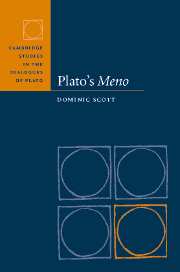Conclusion
Published online by Cambridge University Press: 29 September 2009
Summary
THE UNITY OF THE DIALOGUE
Although much of this book has been devoted to examining the arguments of the Meno individually, it has also been concerned to read the dialogue as a whole. In the event, this has meant a number of things: sometimes a matter of ironing out inconsistencies between different claims made across the work, sometimes of showing how different passages interrelate or support each other. But one of the main challenges of reading the dialogue as a whole is the question I raised at the outset (p. 3 above): what is the Meno about? We are now in a position to address this explicitly. Faced with the large number of different topics covered in the dialogue, some commentators have sought to find a single underlying theme, claiming that is it ‘about’ virtue, inquiry or knowledge. But in the light of what we have said, it is a mistake to look for a unity of this kind. The fact is that the main protagonists cannot agree on what they should be discussing. Socrates wants to talk about the nature of virtue, Meno about its acquisition. His inability to define virtue leads to a protracted struggle, in the course of which certain methodological and epistemological concerns are aired. So what Plato actually offers us is a dramatised conflict of interests. In a sense, the Meno is a dialogue that cannot quite decide what it is about, and that conflict is essential to the work.
- Type
- Chapter
- Information
- Plato's Meno , pp. 214 - 218Publisher: Cambridge University PressPrint publication year: 2006

